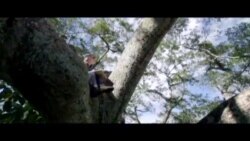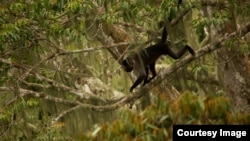French filmmaker Luc Jacquet won worldwide acclaim for his 2005 Academy Award-winning documentary March of the Penguins.
Now Jacquet is back with a new film that takes movie-goers deep into the heart of a tropical rainforest - not only to celebrate its grandeur, but to make the case for its survival.
He calls Once Upon a Forest 'a visual poem' that conveys the wonder of the rainforest, “just to say once again how these forests are amazing, how they are fascinating, how they are in balance.” He spent five months with his crew filming in majestic forests in Gabon and Peru.
Jacquet teams with famed French botanist Francis Halle to tell the forests' story, which opens with the 75-year-old Halle calmly drawing on his sketch pad. He is perched 70 meters up in the parasol-like crown of a Moabi tree in Gabon's Congo River Basin.
Jacquet says his work on the film helped him understand for the first time what Halle has been preaching for decades, that trees have their own way to be alive.
“When you think this way," Jacquet said, "you discover a new universe, a universe of trees. It is interesting because at that point you begin to start to think that this is not the animals who are the kings of the forest. The trees are the kings of the forest.”
The movie captures the life story of the rain forest. Within that tale are dozens of actors - a parade of leaf-cutting ants, a fruit-eating, seed-dropping monkey, a jaguar that prowls across the screen with stealthy steps and vines that entangle a mighty strangler fig tree to make way for another giant to take its place in the forest.
Some of those events can take hundreds of years in tree time, so Jacquet speeds them up by animating Halle’s drawings and mixing them with close-up live action.
Inside all this imagery is a world where every plant and every animal is intimately connected with one another. Trees keep this ever-growing, ever-changing family in balance.
The filmmaker finds the interaction amazing.
"We start to understand the language of the trees and the language of the flowers," he said. "There is a very complex chemical substance in the forest, and we know that trees are not talking with words, they are talking with scents and they are able to mix this scent like words to make a text, and they are able to exchange messages. They are able to modify the behavior of animals with this substance.”
Jacquet captures the magic of a fleeting cloud or the dazzle of sunlight streaming through a break in the canopy in exquisite detail, with sweeps across grand vistas and close-ups that travel the length of a single tree, shot by remote cameras mounted on small flying drones.
The filmmaker sews these scenes together to put the soul of the forest on the big screen. He says walking its hallowed grounds and following its daily rituals tap into what it means to be human.
“There is something very ancient in our brain," Jacquet said. "I guess this is an idea, but I think we are deeply made to be there.”
And, if people can forge that bond with nature, Jacquet says, to see themselves as part of the forest and not alien to it, we are a step closer to saving the rainforest rather than becoming an agent in its demise.
Once Upon a Forest is being shown worldwide at film festivals, is in commercial release in Europe, and will be seen later this year in Asia and Latin America.
Now Jacquet is back with a new film that takes movie-goers deep into the heart of a tropical rainforest - not only to celebrate its grandeur, but to make the case for its survival.
He calls Once Upon a Forest 'a visual poem' that conveys the wonder of the rainforest, “just to say once again how these forests are amazing, how they are fascinating, how they are in balance.” He spent five months with his crew filming in majestic forests in Gabon and Peru.
Jacquet teams with famed French botanist Francis Halle to tell the forests' story, which opens with the 75-year-old Halle calmly drawing on his sketch pad. He is perched 70 meters up in the parasol-like crown of a Moabi tree in Gabon's Congo River Basin.
Jacquet says his work on the film helped him understand for the first time what Halle has been preaching for decades, that trees have their own way to be alive.
“When you think this way," Jacquet said, "you discover a new universe, a universe of trees. It is interesting because at that point you begin to start to think that this is not the animals who are the kings of the forest. The trees are the kings of the forest.”
The movie captures the life story of the rain forest. Within that tale are dozens of actors - a parade of leaf-cutting ants, a fruit-eating, seed-dropping monkey, a jaguar that prowls across the screen with stealthy steps and vines that entangle a mighty strangler fig tree to make way for another giant to take its place in the forest.
Some of those events can take hundreds of years in tree time, so Jacquet speeds them up by animating Halle’s drawings and mixing them with close-up live action.
Inside all this imagery is a world where every plant and every animal is intimately connected with one another. Trees keep this ever-growing, ever-changing family in balance.
The filmmaker finds the interaction amazing.
"We start to understand the language of the trees and the language of the flowers," he said. "There is a very complex chemical substance in the forest, and we know that trees are not talking with words, they are talking with scents and they are able to mix this scent like words to make a text, and they are able to exchange messages. They are able to modify the behavior of animals with this substance.”
Jacquet captures the magic of a fleeting cloud or the dazzle of sunlight streaming through a break in the canopy in exquisite detail, with sweeps across grand vistas and close-ups that travel the length of a single tree, shot by remote cameras mounted on small flying drones.
The filmmaker sews these scenes together to put the soul of the forest on the big screen. He says walking its hallowed grounds and following its daily rituals tap into what it means to be human.
“There is something very ancient in our brain," Jacquet said. "I guess this is an idea, but I think we are deeply made to be there.”
And, if people can forge that bond with nature, Jacquet says, to see themselves as part of the forest and not alien to it, we are a step closer to saving the rainforest rather than becoming an agent in its demise.
Once Upon a Forest is being shown worldwide at film festivals, is in commercial release in Europe, and will be seen later this year in Asia and Latin America.










